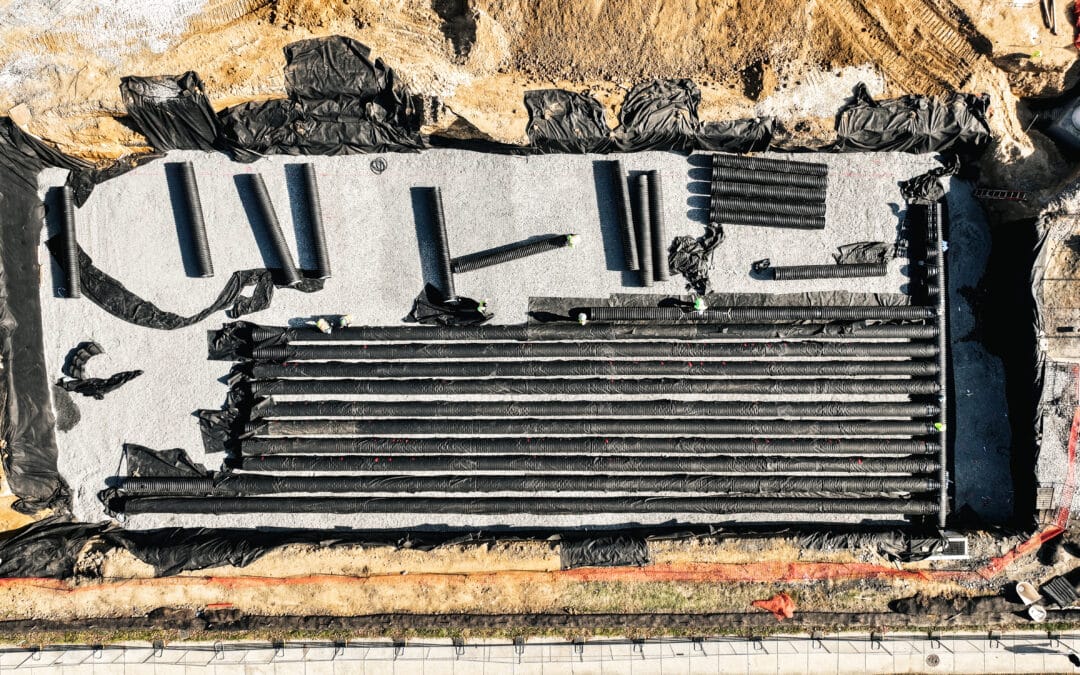Project DetailsCheyney UniversityLocation - Cheyney, PAProject Scope Installed new water main Completed sewer and stormwater drainage systems Constructed new curb and sidewalk

When most people think about sustainability in construction, their minds jump to renewable materials, energy-efficient equipment, or green certifications. But there’s a quieter, equally powerful contributor to a sustainable future: asphalt maintenance programs.
At Delaware Valley Paving, we believe that maintaining what you already have is one of the most impactful — and often overlooked — ways to reduce environmental impact. Here’s why.
Every year that a parking lot, roadway, or pathway remains in good condition is a year that avoids the energy, materials, and emissions needed for full replacement. Preventative maintenance like sealcoating, crack sealing, and patching slows deterioration, extending pavement life by years — sometimes decades.
By reducing the frequency of major reconstruction, we minimize waste sent to landfills and conserve the natural resources used to produce new asphalt.
Full-depth asphalt replacement involves heavy hauling, high heat, and intensive equipment — all of which contribute to greenhouse gas emissions. In contrast, targeted maintenance uses fewer materials, requires less fuel, and has a much smaller carbon footprint.
Even small, routine actions like filling cracks before water seeps in can prevent large-scale repairs that would have a significantly higher environmental impact.
A well-maintained asphalt surface prevents water infiltration into the subbase, protecting not only the pavement but also the surrounding drainage systems. This helps keep stormwater infrastructure functioning as designed, reduces erosion, and supports compliance with environmental regulations.
Asphalt production relies on aggregates and binders that come from finite natural resources. Extending the life of existing pavement through proactive care means less demand for new raw materials — a direct win for conservation efforts.
Sustainability isn’t just about the planet — it’s about long-term cost efficiency. Preventative maintenance can cost a fraction of full reconstruction, allowing property owners to protect budgets while also protecting the environment.
At Delaware Valley Paving, our maintenance programs are built to maximize pavement life, reduce environmental impact, and keep your property looking its best year after year. From proactive inspections to customized repair plans, we help clients take a long-term, sustainable approach to pavement care.
Because the greenest pavement is the one you don’t have to replace.
Ready to make your pavement part of your sustainability plan?
Let’s talk about a customized asphalt maintenance program for your property.
The industrial real estate sector is undergoing a quiet but significant transformation. At the center of this shift is the rapid rise of Industrial Outdoor Storage (IOS)—a niche asset class that’s becoming essential to supply chain and logistics operations across the country. It’s used for stowing equipment/materials, vehicles, or outdoor containers. We have been seeing it aggressively growing for the past few years- With leading companies like Alterra, Realterm and Jadian at the helm.
After sitting in on some good events and speaking with people, I’ve learned about the industry and what is driving growth. The explosion of e-commerce has placed new demands on delivery speed and last-mile logistics, creating the need for strategically placed outdoor storage near urban centers and transportation corridors. Meanwhile, port congestion and rising industrial land prices are pushing companies to rethink how and where they store their equipment and containers.
At the same time, IOS offers flexibility and cost-effective development. Operators can scale up or down without committing to expensive vertical infrastructure. And from an investment standpoint, these sites are cost-effective to develop, fast to lease, and increasingly scarce- especially in tightly zoned metropolitan areas.
Unlike traditional warehouses or distribution centers, IOS facilities are simpler in form—typically large, paved lots used to store trailers, shipping containers, fleet vehicles, construction equipment, and other heavy assets. Yet simplicity is deceptive. As demand surges, getting IOS sites properly designed and built has become a critical—and often overlooked—competitive edge.
Despite the relatively straightforward appearance of an IOS site, building one right takes more than just leveling dirt and laying down asphalt. The pavement needs to withstand the constant wear of heavy equipment and high traffic. Drainage and grading must be precise to avoid flooding, pooling, or erosion. And regulations around stormwater management and zoning compliance can introduce costly delays if not managed properly. Many property owners and developers underestimate the technical demands of building IOS sites… until they’re faced with premature pavement failures or tenant dissatisfaction.
I’m personally looking forward to seeing where the asset class goes in the next few years. If you’d like to speak about your next project, feel free to call me directly.
We handle full-site development including:
✔ Grading and subbase prep
✔ Drainage and stormwater systems
✔ Lighting and electrical infrastructure
✔ Fencing and access control
✔ Concrete pads, aprons, and paving
✔ Utility coordination and permitting